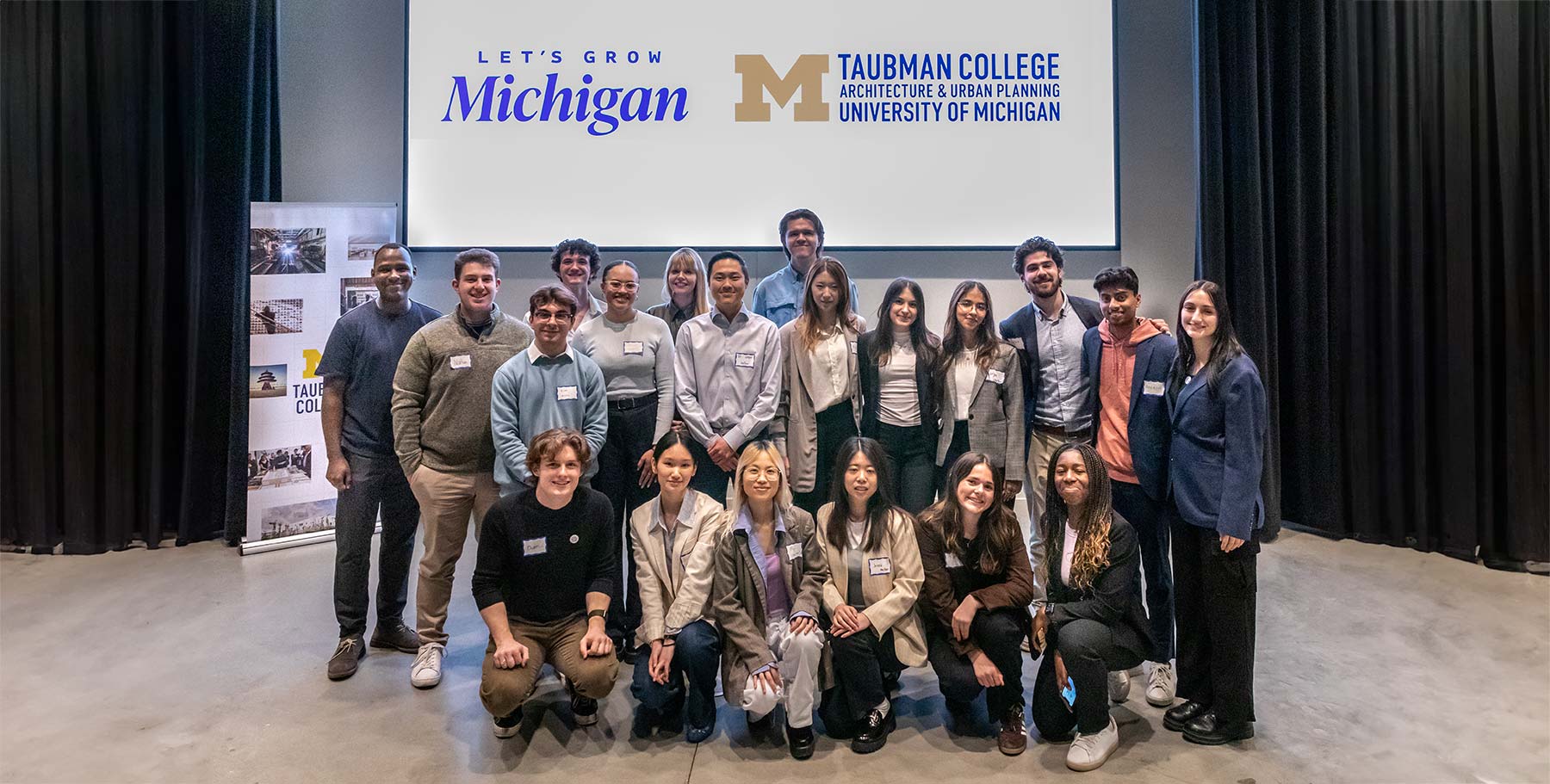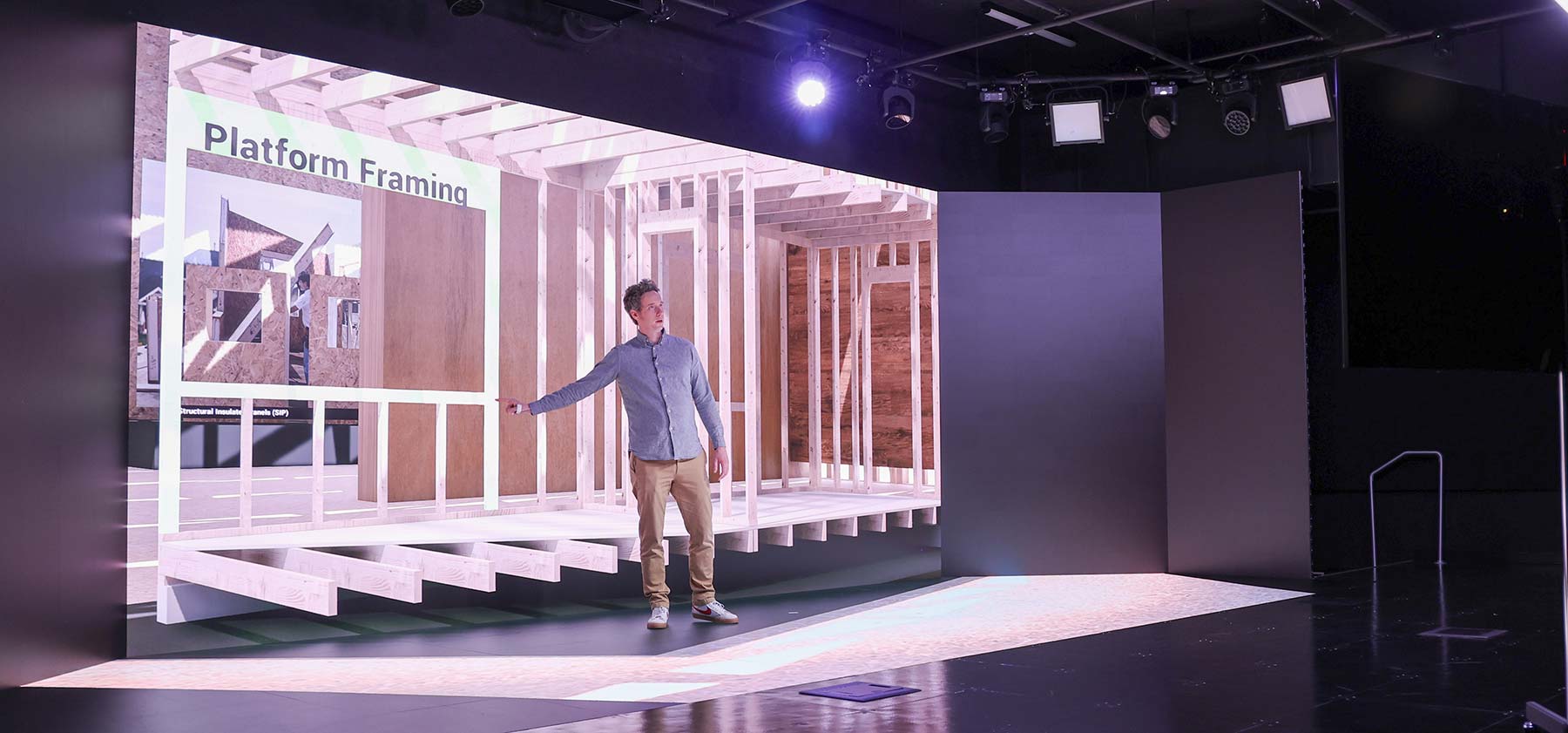When students Katie Economou, M.U.R.P. ’23; Kira Barsten, M.U.R.P. ’23; and Camilla Lizundia, M.U.R.P. ’22, enrolled in URP 611: Advancing Racial Equity, which featured workshops led by 2022 Sojourner Truth Fellow Britt Redd, they didn’t expect they’d be planning a course at Taubman College soon.
“One of the workshops that I facilitated was reckoning with the history of planning,” says Redd. “We had a lot of conversations about things like redlining, which is becoming more mainstream. But it should go further than that. That’s just a symptom. Part of my professional practice is to tell that history and prioritize a deeper understanding. Even before I came on board, there was an effort to prioritize anti-racism in the college, so my workshop aligned with the momentum that was already going.”
Redd’s workshops led Economou, Barsten, and Lizundia to consider how to better prepare themselves and their fellow students to address lasting urban inequities.
“Britt Redd’s discussion of planning’s dirty history before the 1900s was illuminating,” says Economou. “Their discussion started with chattel slavery and indigenous land theft in the United States; we were aware of that history but not in the planning context. The course also applied lessons from history to how we could move forward
with restorative planning tools.”
The three found themselves discussing the gaps in Taubman College’s curriculum that were highlighted by Redd’s workshop. They recruited Sam Limerick, M.S./M.U.R.P. ’23, and together they crafted a proposal to address those gaps which they presented to Larissa Larsen, chair of urban and regional planning.
“These were clearly capable students. They had the energy and passion and were going about this in a very thoughtful and methodical way. I thought we’d be fools not to do it,” says Larsen.
Next, the team solicited feedback and collaboration from their fellow students for what would eventually become URP 611: Radical Planning, a student-organized speaker series designed to change the status quo of existing planning practices and challenge how conventional planning processes have enforced the material construction of inequities in the built environment.
“We didn’t want to do this siloed,” says Economou. “You can’t create a course for everyone without meaningfully including everyone’s input.”
Summer and fall of 2022 were filled with collaborative workshops, which included scoping the definition of radical planning, determining topics and speakers, and drafting a syllabus. Economou and Barsten admit there was a learning curve when it came to all of the logistics that go into planning and running a college course, calling the process “kind of messy.”
They persevered, and the course, which ran for the first time during the winter 2023 semester, drew participation from across the university. In addition to Taubman College students, class members came from SEAS, the Ford School, the SPH, and more.
Practitioners and community organizers who joined the class in winter 2023 included Redd, principal planner for land use strategy for the City of Indianapolis; José Richard Aviles, an equitable transportation planning analyst at the Othering & Belonging Institute at UC Berkeley; and Simone Sagovac, director of the Southwest Detroit Community Benefits Coalition. Topics included coalition building, indigenous and settler theories of land, and participatory budgeting, among others.
Each week speakers shared lessons and tactics from their on-the-ground work and provided advice and examples of change-making, primarily to address the lasting disparities and spatial inequalities that remain, due to past planning actions. They also offered students insight into how to get involved with specific movements and shared contact information with course students for further discussion.
“At times it’s challenging to imagine beyond ‘traditional’ U.S. planning conventions. It’s helpful connecting with people who are advancing transformative change both inside and outside the system. We’re not starting from square one. As future planners, we can apply speaker aims of centering equity in our work to avoid perpetuating harm,” says Economou.
Larsen often referred to Radical Planning when teaching her required applied course where students work for communities. “I’m struck by the number of times I’ve said, ‘Remember on Monday in Radical Planning, we learned about the importance of this?’ Hearing the speakers’ voices and approaches connects really well with the classroom,” she says.
The students who started this movement have been deliberate about ensuring it’s sustainable. One strategy they employed was hiring first-year M.U.R.P. students Vaidehi Shah and Griffin Sproul, both M.U.R.P. ’24, to help out with the course in winter 2023 so they’re prepared to continue the course next year.
“It’s an issue a lot of student organizers face. You’re only here for so long, so how do you institutionalize something like this?” Barsten says. “Part of ensuring this doesn’t end when we leave was hiring Vaidehi and Griffin, who will be able to carry this on. There have also been funding conversations with faculty across the college about what we’re doing now, how we make it sustainable, and how we demonstrate how much value students are getting out of the course.”
The students’ hard work is a testament to their passion for their future profession and Taubman College. In addition to being beneficial to current students, they hope Radical Planning will empower future students to practice urban planning through the lens of social justice.
Portico: Spring 2023
- Visualizing the Future
- Beth Gibbons, M.U.P. ’12, and Izzy Beshouri, M.U.R.P. ’24, Know There’s No Time to Waste When It Comes to Climate Adaptation
- Vince Hoenigman, M.U.R.P. ’94, Sees the Opportunity in Every Problem
- Architecture Fellowship Program: A Conduit for Innovation Since 1984
- Collective for Equitable Housing Explores Solutions to Growing Affordable Housing Crisis
- Taubman College Students Recognize the Power of Radical Planning
- David Lepo, M.U.P. ’78, Gives Because of the Lasting Impact of His Taubman College Education
- Kristen Padavic, B.S. Arch ’98, Draws Connections
- Help Taubman College Build Tomorrow: Dylan Vaughn-Jansen’s Story





